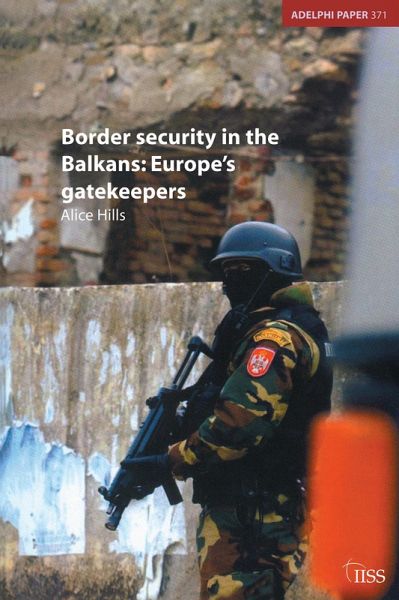
Border Security in the Balkans (eBook, PDF)
Europe Gatekeepers
Versandkostenfrei!
Sofort per Download lieferbar
25,95 €
inkl. MwSt.
Weitere Ausgaben:

PAYBACK Punkte
13 °P sammeln!
Borders dominate the security agenda in South-east Europe. Political and ethnic discontents focus on disputed borders, while traffickers in migrants and drugs ignore them.The EU argues that the Balkan countries should develop models of border management using its policing standards, but the region is rife with corruption and its border guards are both under-resourced and ineffective. This Paper asks how and why border management in South-east Europe is developing as it is, and what this might mean for the future of Europe. Drawing on recent experience in Bosnia, Herzegovina, Slovenia, Macedoni...
Borders dominate the security agenda in South-east Europe. Political and ethnic discontents focus on disputed borders, while traffickers in migrants and drugs ignore them.The EU argues that the Balkan countries should develop models of border management using its policing standards, but the region is rife with corruption and its border guards are both under-resourced and ineffective.
This Paper asks how and why border management in South-east Europe is developing as it is, and what this might mean for the future of Europe. Drawing on recent experience in Bosnia, Herzegovina, Slovenia, Macedonia and Albania, it looks at the ways in which the regions' borders are managed, and gauges the development of a consensual European approach to border security. It shows how governments and guards understand the predicament of regional insecurity, and how they respond with strategies that accommodate, evade or subvert unavoidable political pressures.
This Paper asks how and why border management in South-east Europe is developing as it is, and what this might mean for the future of Europe. Drawing on recent experience in Bosnia, Herzegovina, Slovenia, Macedonia and Albania, it looks at the ways in which the regions' borders are managed, and gauges the development of a consensual European approach to border security. It shows how governments and guards understand the predicament of regional insecurity, and how they respond with strategies that accommodate, evade or subvert unavoidable political pressures.
Dieser Download kann aus rechtlichen Gründen nur mit Rechnungsadresse in A, B, BG, CY, CZ, D, DK, EW, E, FIN, F, GR, HR, H, IRL, I, LT, L, LR, M, NL, PL, P, R, S, SLO, SK ausgeliefert werden.













